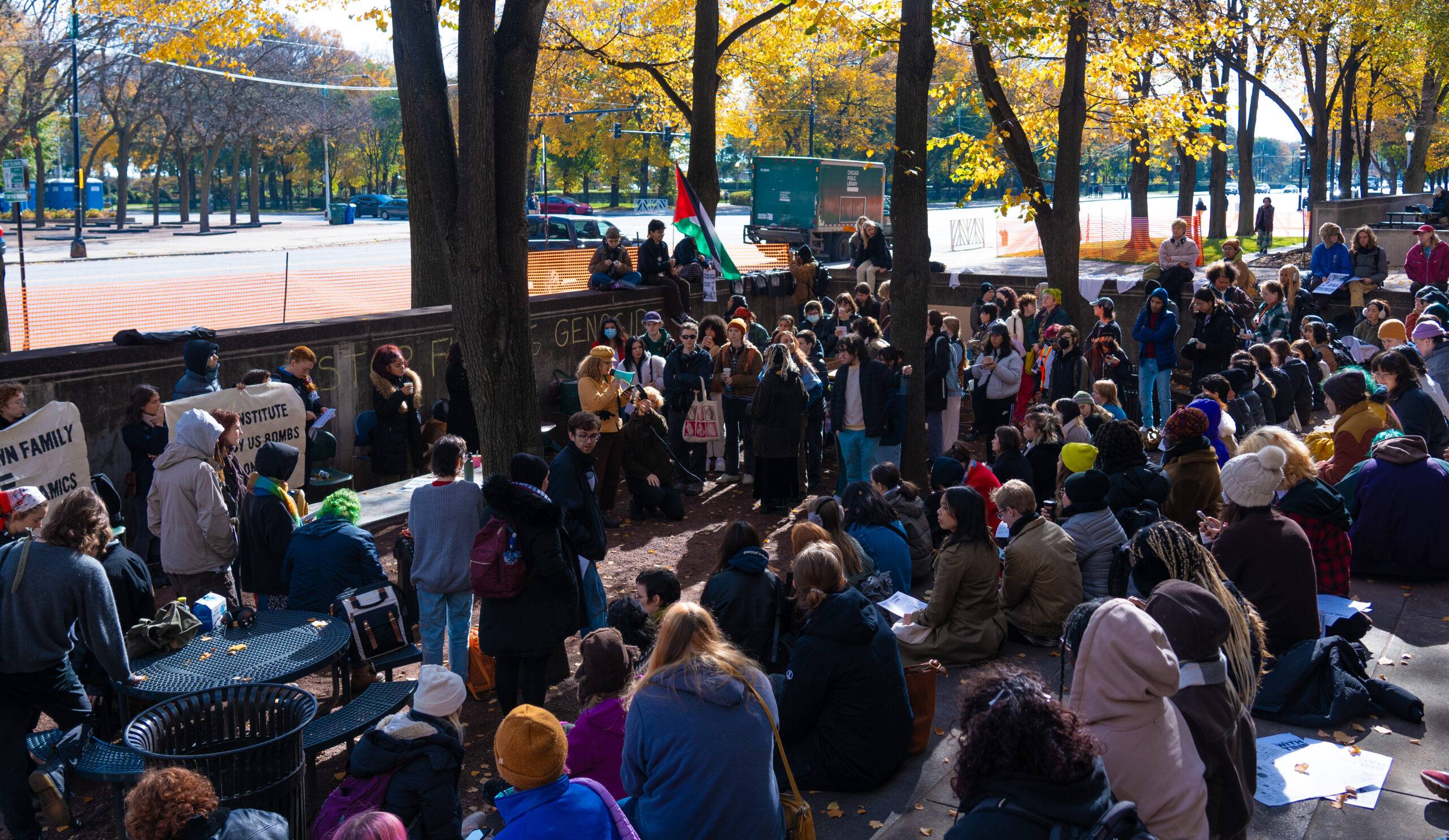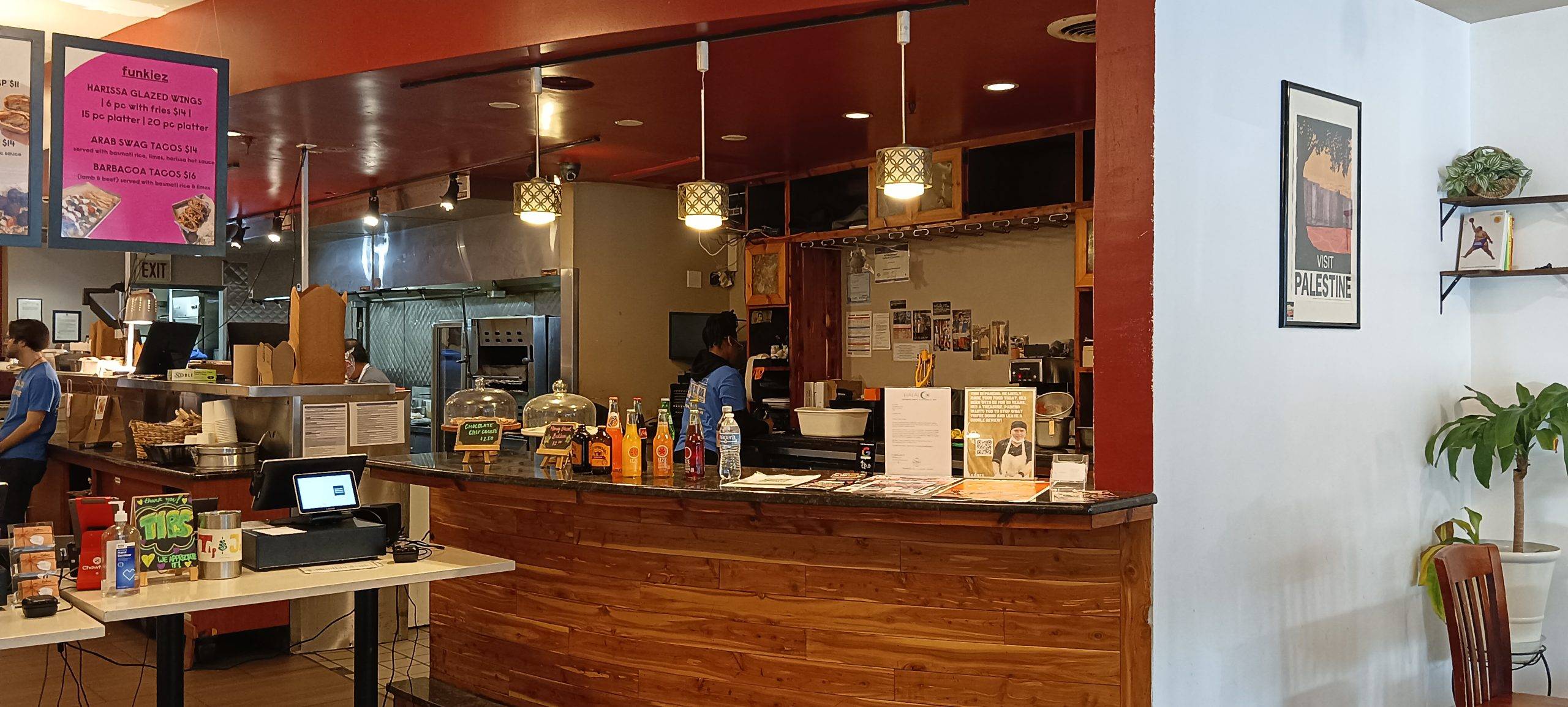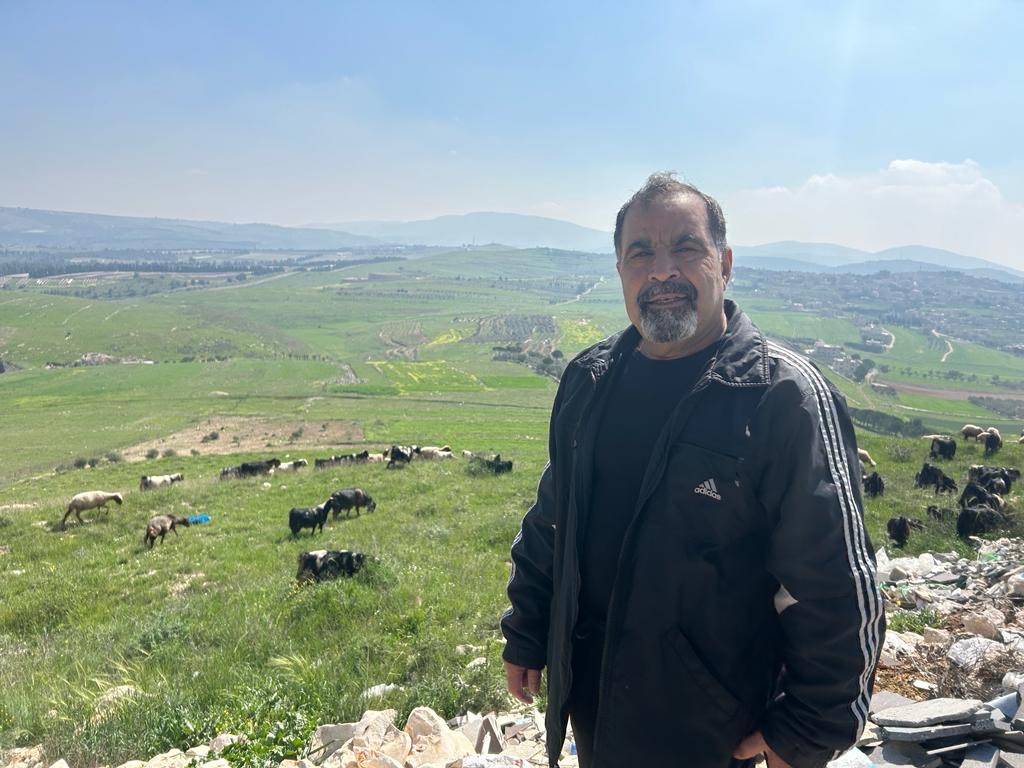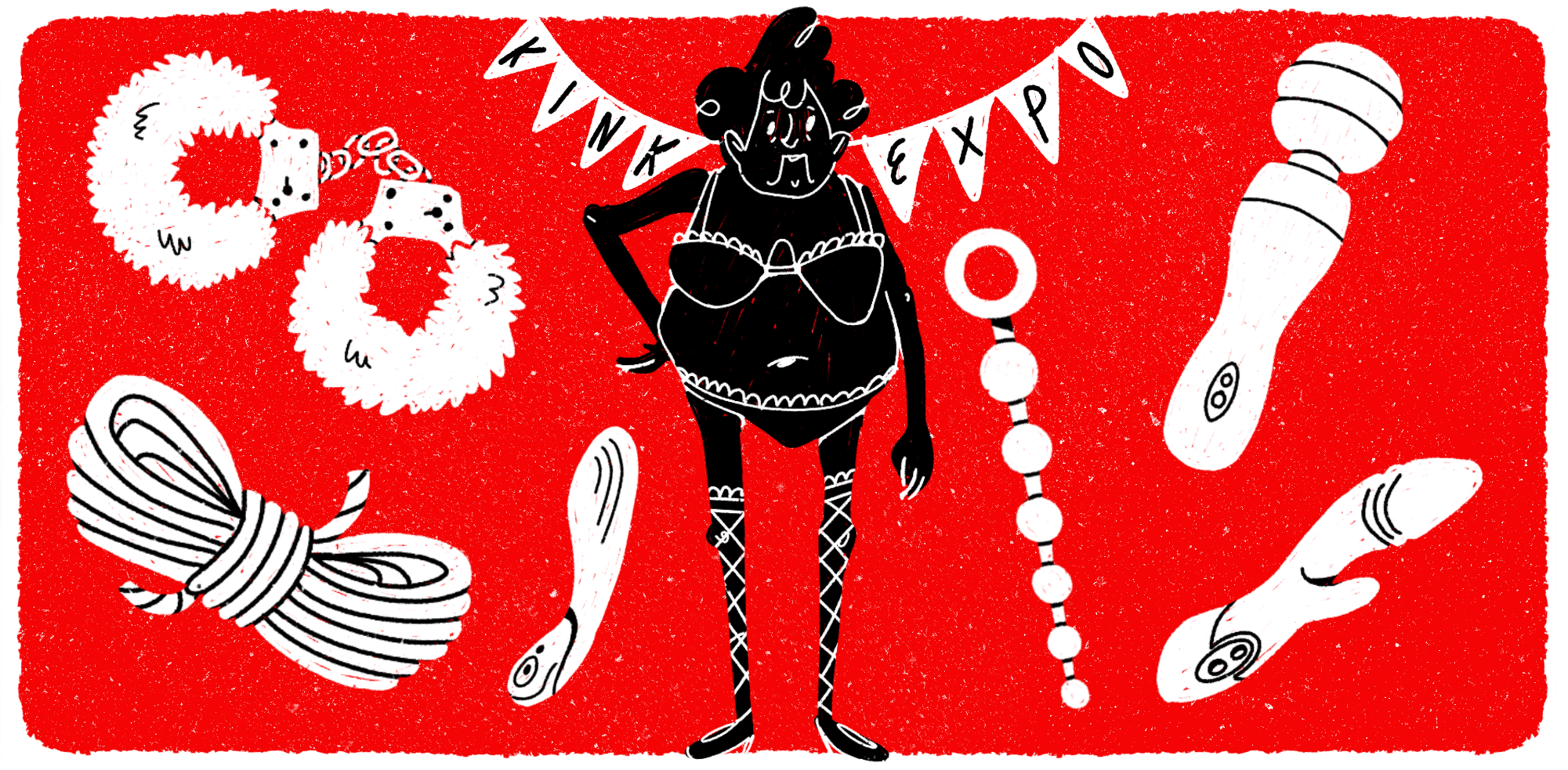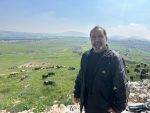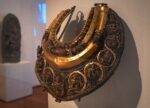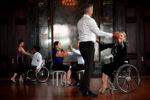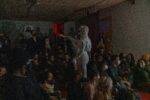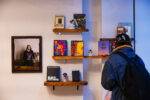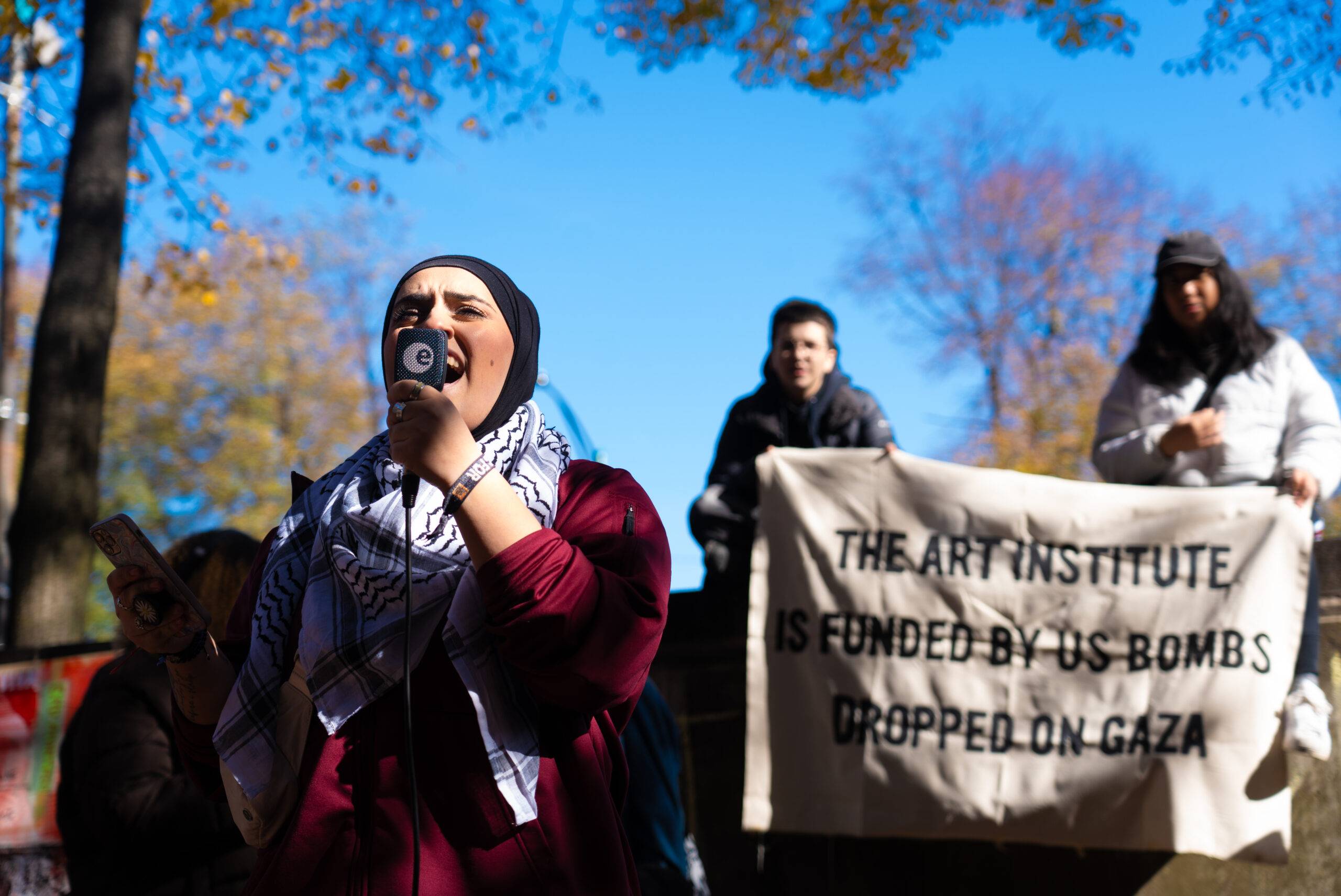
On Nov. 2, members of the student-movement organized an event at the pit of 280 Building extending their support to Palestinian people. Photo by Nitya Mehrotra
Since the escalations of violence began in Palestine on Oct.7, The School of the Art Institute of Chicago has sent out three emails in response.
Addressed to the school community and penned by President Elissa Tenny, the first email sent on Oct.9, referred to the event as “tragic news… that has been deeply disturbing and heartbreaking.”
The second email came on Oct.18, where Tenny acknowledged the loss of lives from both sides, and also addressed that one member of the SAIC community expressed views that caused “distress among those both within and beyond the campus.” (An SAIC professor shared some content on their personal account that many found offensive.)
“SAIC is vehemently opposed to all terrorism, including the terrorist acts of Hamas. Furthermore, we are heartbroken that so many innocent lives, both Israeli and Palestinian have been lost or thrown into turmoil,” the email read.
Several students at SAIC, however, said they aren’t content with the way the school has addressed the genocide in Palestine, which has resulted in the death of more than 10,000 civilians. These students believe the school has taken a neutral stance in a time where violence in the Middle East is at its peak.
“The email (the first one) sounded sentimental. It says that if you’re feeling sad or confused we’re here to hold your hand. It completely depoliticized this moment,” said Marvin Veloso (MAVCS 25).
Mira Samantha (MA AE 25) agreed with Veloso.
Samantha said it is important for the school to present a full picture and to acknowledge that Palestinian civilians are not numbers, they are people with lives.
“There is no liberation without liberation for the Palestinians,” she said.
Some SAIC Students from Middle Eastern heritage who have personal ties to the region claim that the school and its atmosphere is so isolating that they don’t feel they have spaces where they can talk about how they are personally impacted by the war.
When Israa Darwich, a Lebanese American (MFAW 25) student, found that escalation began in Palestine, she was worried about her grandfather.
“He was in his home in South Lebanon on Oct. 7, and right away we told him he needs to come back [to the USA], because he lives at the border,” she said. (South Lebanon shares a border with Palestine, which is a war zone.)
“I was sitting there. My grandpa told me he was struggling to get a ticket. For a second I wasn’t sure if he would be able to come home as after the war broke out I saw news of bombing, and firing of artillery shells containing white phosphorus in South Lebanon. Nobody acknowledged what was happening so I had to sit in silence knowing it was not welcome to talk about it in class,” Darwich added.
Samhita Sonti (MA AH 24), said she felt the same way about the silent environment she experienced in her classes.
“A lot of our classes deal with ideas of decolonization and land acknowledgments and diversity. We love to use these buzzwords in academia, and when this is happening in real life, we refuse to put words to it. There is extreme cognitive dissonance. It’s clear that white academia is turning a blind eye to this,” she said.
But why is SAIC taking a neutral stance? Why isn’t it having active discussions on what is happening in Palestine and condemning those who are responsible for it?
Some students suspect that it is because the school fears losing one of their biggest funders — the Crown Family.
One of the richest business families in the country, the Crown Family has strong ties with SAIC and the Art Institute of Chicago. Steven Crown, one of the members of the family, is on the board of trustees of AIC and SAIC. The museum also has a gallery named after Henry Crown, the patriarch of the family. Furthermore, in 2016, the school received a $2 million endowship from the family for a professorship in painting and drawing.
Several students at SAIC have called for the school to sever its ties with the Crown Family due to their significant ownership stake in General Dynamics, a military manufacturing and selling company known for supplying weapons used by the Israeli army in actions against Palestinian civilians.
“General Dynamics develops weapons that are used within the US Mexico border, Syria, and Palestine. I refuse to be silent and I refuse to be complicit. The irony behind this is that [the Crown Family is] using art to promote violent agendas, the whole thing behind art washing that’s not being said,” said Veloso.
Makayla Rene (BFA 2026) called this funding “blood money.”
“I think that the school wants to hold a neutral position, which is already so questionable, they shouldn’t accept money that is literally blood money,” said Rene.
The dissent between the administration and student body has led to an underground movement within the community where students from various ethnicities have come together to provide communal care, spaces to talk, and to grieve.
F Newsmagazine spoke to B, one of the students, who’s an active member of the movement. A grad student in the art history department, B claimed that the student government on campus is heavily influenced by the institution which only puts down student voices and demands. As a result, the students have started their own, which is free from any institutional influence.
“If the institution continues the way it’s going, they will continue to lose students’ trust and more,” said B. (F Newsmagazine is referring to the student as B for privacy reasons.)
On Nov. 2, members of the student-movement organized an event at the pit of 280 Building extending their support to Palestinian people. During the event, attended by approximately 300 community members, as reported by the organizers, the students called on the school to cut its ties with the Crown Family and to extend its support to Palestinian civilians.
Some students who attended the event said that the administration wasn’t friendly with protesting students.
“The security personnel from the school asked us to take down our posters, and said that we can’t continue our event on school property. They tried to grab the signs the students had put up, but students grabbed them and held them up for the rest of the event [instead of putting them on the wall],” said a student, who attended the rally. (The student is staying anonymous for security reasons.)
“They did everything from stopping students from gathering, to taking pictures and videos of them. Security’s whole narrative was to protect students, and if that was the intention then K9 trucks wouldn’t be in students’ faces when they’re trying to create a safe space to grieve and talk,” said B.
According to John Pack, Director of Campus Security, the event didn’t follow an appropriate process.
“We absolutely allow student events and art-making activities on our campus; we simply ask organizers to follow the established process,” he said.
Regarding the presence of an armored truck, he said, “At some point during the gathering, a courier service that we contract with arrived in their truck to take cash deposits to our bank. This was a previously scheduled pick-up.”
When asked about why the security people took the pictures and videos of students during the walkout, he offered no comment.
Students, however, felt that even if they didn’t ask for permission they were exercising their right to freedom of assembly. They said they believe that through the gathering, they created a space where they could acknowledge the pain of some of the students who are directly impacted by the violence in Gaza.
“We students are one. We will no longer be complicit. The school has a duty to protect our rights and safety, including international students who face risk of deportation for their participation in marches and demonstrations,” said Ethan Allen (BFA 24).
Addressing the student-led protest, on Nov. 3, President Tenny sent an email, in which she called the gathering, “unsanctioned” and wrote that some of the language used by the students at the event “disturbed the equilibrium of some community members.”
According to Velso, the school completely missed the point of the demonstration.
“Disrupting the equilibrium was the point. We actually made aware that there was inequality. We made visible the scales were never just. We didn’t come here to maintain these oppressive structures,” he said.
FNewsmagazine reached out to President Tenny following the student walkout, and the students’ response to her email.
“During the protest, a particular phrase that some consider anti-Semitic made some members of our community feel unsafe, even hated. This is the disequilibrium referenced in my email last week, which was not meant to curtail expression but to encourage all of us to be aware of how our words may affect others, even when those effects are unintended,” she said.
In regards to how students want SAIC to cut its ties with the Crown family, the President offered no comments.
However,Tenny said that she challenges the assumption that the protesting students and the administration “are at odds with one another.” She reinforced that the faculty and staff are developing programs to create “space and opportunities for learning and dialogue about Israel, Palestine, and the region.”
On Nov.10, more than a month after the start of the violence, SAIC sent out an email with the subject line: “Programs to Address the Violence in Israel and Palestine.” The email listed five events for November.
“It is our responsibility as a School to foster a safe learning environment for all while also encouraging self expression, which means not only being true to ourselves but respectful of others’ sense of security. When an equilibrium is achieved, students are not shielded from polemic ideas but have the space to confront some of them,” wrote Tenny in her email to F News.
Students, however, said they feel differently. They believe the school hasn’t created a room for them to share their responses and feelings.
“I feel like there’s a lot of deliberate silence. Arab, brown, Muslim, and Palestinian students are feeling very isolated and not seen. As a school that claims to be diverse, that needs to be checked,” said Sonti.
B said she feels frustrated on how the school addresses the sufferings of people of color, with no proper acknowledgement.
“So a 6-year-old was stabbed 26 times within two hours of our city and there was no expression of remorse, or reaction from the President’s office. When a professor talks about something on their personal Instagram, it’s national news,” she said.
“My community is being hurt. My faculty is being hurt. We [the underground community] are working for the institution. We are doing the job that the institution should be doing for us,” she added.


